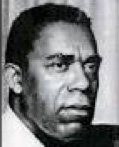 Dudley Randall
Dudley Randall
(1914-2000)
Dudley Randall was born on January 14, 1914 in Washington D.C. His family moved to Detroit in 1920. Randall’s first poem appeared in the Detroit Free Press when he was 13.
He worked in a foundry of the Ford Motor Company in Dearborn, Michigan from 1932 to 1937. He also worked as a clerk at a Post Office in Detroit from 1938 to 1943 and served in the military during World War II. He worked at a post office while he attended Wayne State University in Detroit, and earned a Bachelor of Arts degree in English in 1949. Randall then completed his Master’s degree in Library Science at the University of Michigan in 1951. He worked as a librarian at Lincoln University in Jefferson City, Missouri and later at Morgan State College in Baltimore, Maryland. Finally, in 1956, he returned to Detroit to work at the Wayne County Federated Library System as head of the reference-interloan department.
Randall experimented with a variety of styles in his own poetry. His poetry is characterized by its simplicity and realism. Randall’s most famous poem is Ballad of Birmingham, in response to the 1963 bombing of a Baptist church in Birmingham, Alabama, where four girls were killed.
He founded a publishing company called Broadside Press in 1965, which published many leading African American poets and political writers. The first collection by the press was Poem Counterpoem (1966). He then published Cities Burning (1968), a group of thirteen poems, in response to a riot in Detroit. Another fourteen poems appeared in Love You in 1970, followed by More to Remember in 1971 and After the Killing in 1973. Some of his other well-known works are: A Poet is not a Jukebox, Booker T. and W.E.B., and The Profile on the Pillow.
The composer Hans Werner Henze used the words of Randall's poem Roses and Revolutions in his 1973 song cycle Voices.
He received the Poet Laureate of the City of Detroit in 1981 by Mayor Coleman Young.
Randall died on August 5, 2000 and is buried in Section A, Lot 104.
